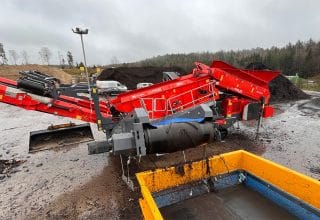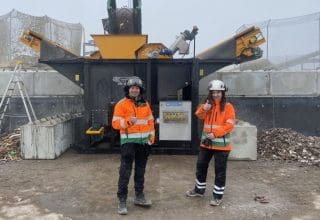Cleaner fuel through the processing of wood waste
The processing of wood waste involves converting forest industry residues, construction waste, and other wood waste into usable fuel. An important part of this process is the removal of contaminants that can damage heating plant equipment and increase emissions of harmful substances. By using advanced purification techniques, the wood fuel can be cleaned of metals, plastics and other contaminants. This leads to cleaner combustion, reducing the load on the treatment system of the heating plant and contributing to a cleaner environment. Read more about our wood waste processing solutions here.
Optimized size for increased efficiency
The size of the wood fuel also plays a crucial role in the efficiency of combustion. By adapting the size of the wood pieces to the combustion system of the heating plant, a more even and efficient combustion can be ensured. This means not only that more energy can be extracted from each piece of wood waste, but also that combustion is more controllable.
Purified wood flows with the right separation technology
Fuel size optimization, together with the separation of energy consuming materials such as stones and gravel, contributes to increased energy efficiency. Since our plants can easily be integrated with wind screens, water bath and different types of magnets, we can remove all contaminants and unnecessary materials for burning, which leads to reduced greenhouse gas emissions but above all a better economy.
Benefits of refined wood fuels
- Eco-friendly energy production: Processing wood waste into fuel contributes to more sustainable energy production and reduces the need for fossil fuels.
- Higher energy efficiency: Cleaner fuel and optimized fuel size lead to more efficient combustion and higher energy yield.
- Reduced operating costs and downtime: Cleaner fuel reduces wear and tear and maintenance needs on the heating plant's equipment, leading to lower operating costs and less downtime over time.
- Fewer ash management problems: A cleaner combustion process reduces the amount of ash that needs to be managed, simplifying waste management and reducing related costs.
- Improved air quality: A cleaner combustion process, such as the separation of plastics, reduces emissions of harmful substances, which contributes to better air quality.
Concluding thoughts
Processing wood waste into cleaner and more efficient fuel is an important part of the quest for sustainable energy production. By focusing on cleaning the fuel from contaminants and optimizing the size of the wood fuel, thermal power plants can not only increase their energy efficiency but also play a key role in the transition to a more sustainable and clean energy supply. It is time to embrace the potential of refined wood fuels and contribute to a cleaner and greener future.




